********
10 DAYS LEFT TO HIGH CONCEPT SHOWDOWN!
SUBMISSION DETAILS HERE!
********
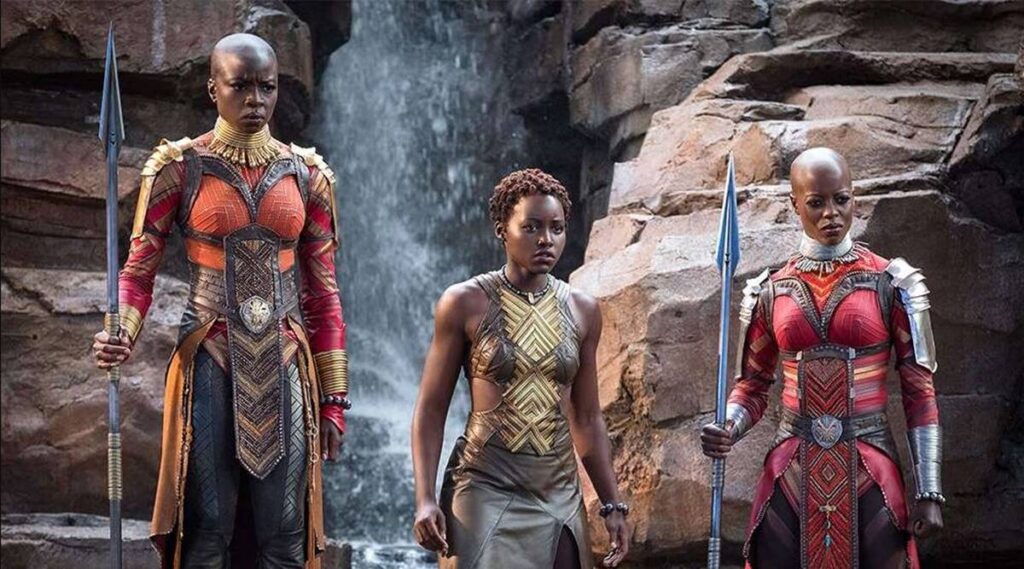
It’s looking like the loss of Chadwick Boseman is affecting Wakanda’s homeland more than Disney was prepared for. Black Panther 2 finished with just 67 million dollars in its second weekend. For reference, the first film took in 111 million on weekend number two.
It’s an indication that word-of-mouth is, much like the film’s central villain, below sea level. In all fairness, it probably should be. The picture’s bite is more minnow than shark, even if its running time is more bloated than a blue whale.
They should’ve made the movie lean like a dolphin and mean like a piranna so that people didn’t have so much time to sit in the theater and think, “Why is this girl pretending to be Iron Man?” Or, “When did the world population become 97% women and 3% men?”
Hollywood is trying its best to ignore the negative outlook, flexing on the film’s half-a-billion dollar global box office. And I don’t blame them. As dysfunctional as the Marvel-audience relationship has become, Marvel is the only theatrical game left in town. If it sputters, what’s left? A Fast and Furious franchise led by a 60 year old? We don’t even have Star Wars movies anymore!
I’ll tell you the movie that’s going to temporarily take care of this issue. A little flick called, Avatar: The Way of Water! I honestly believe this film is going to make Hollywood rethink how they approach the theatrical movie business. James Cameron actually took the time necessary to make sure EVERY frame of his film looks perfect.
![]()
Marvel, meanwhile, employs the opposite approach. They film their movies on conveyer belts. Their action scenes are shot with second unit directors. Their special effects are farmed out to Thailand.
Cameron is there every day making sure he controls each aspect of his vision, even if that takes a lot more time. You can see the results in the trailer. It looks beautiful. The film is going to clean up. I wouldn’t be surprised if it challenged The Force Awakens for that 2 billion dollar global take.
Once that happens, Hollywood is going to have to really think about what it takes to bring audiences to the theater. Because the one adjustment that they haven’t made in this new “Giant Movies Only” theatrical era, is taking your time in order to create the best product possible. They’ve been pumping these things out like Big Macs. And audiences are starting to say, “We want sirloin. Not frozen beef.”
Another movie that isn’t doing so hot is She Said, the film about the two reporters who wrote a Harvey Weinstein expose that helped start the #MeToo movement. The film was released wide and took in only 2.3 million dollars.
I’m just going to say it. Nobody wants to watch movies like this. We have our real life in real life. We don’t need it in our movies. We don’t go to movies to be depressed, to be reminded of depressing things. I can’t, for the life of me, understand why anyone would’ve thought this movie was going to sell more than five tickets.

Universal is out there saying they “had” to make this movie cause it was the right thing to do, or some such nonsense. This new guilt-greenlighting that I see in Hollywood is one of the stranger developments in the market. I never thought I’d see the day when studios purposefully made movies they knew were going to bomb.
I suppose someone could’ve talked themselves into She Said making money via an Oscar run. But I don’t see it. It’s depressing subject matter. It’s stuff we’ve been bombarded with every day in the news for four years. Why would we then want to pay for it? “Oh man, 15 website articles touting #metoo wasn’t enough for me today. I need to pay 20 bucks to see more!”
It’s also confusing. When the Weinstein scandal broke, it was Ronan Farrow getting all the publicity. For the few people in middle America who might’ve been potential audience members here, they’re probably saying, “Who are these chicks?” They want to see the movie about the guy who *actually* broke the case.
If you’re going to shoot for an Oscar run, I suggest doing what The Menu did. The Menu is stylishly directed. It’s got great actors in it. It’s a sophisticated enough story to get Oscar voters intrigued. And, oh yeah, IT’S ALSO ENTERTAINING. The one ingredient Hollywood forgot when coming up with, “She Said.”
As you guys know, The Menu was a favorite script of mine. I’m happy to see it do fairly well this weekend. True, it only made 9 million bucks. But, honestly, I think that’s what you’re topping out at these days if you don’t have either a 200 million dollar budget or an easy-to-market horror film. Everything else seems to finish in the 8-12 million dollar opening range.
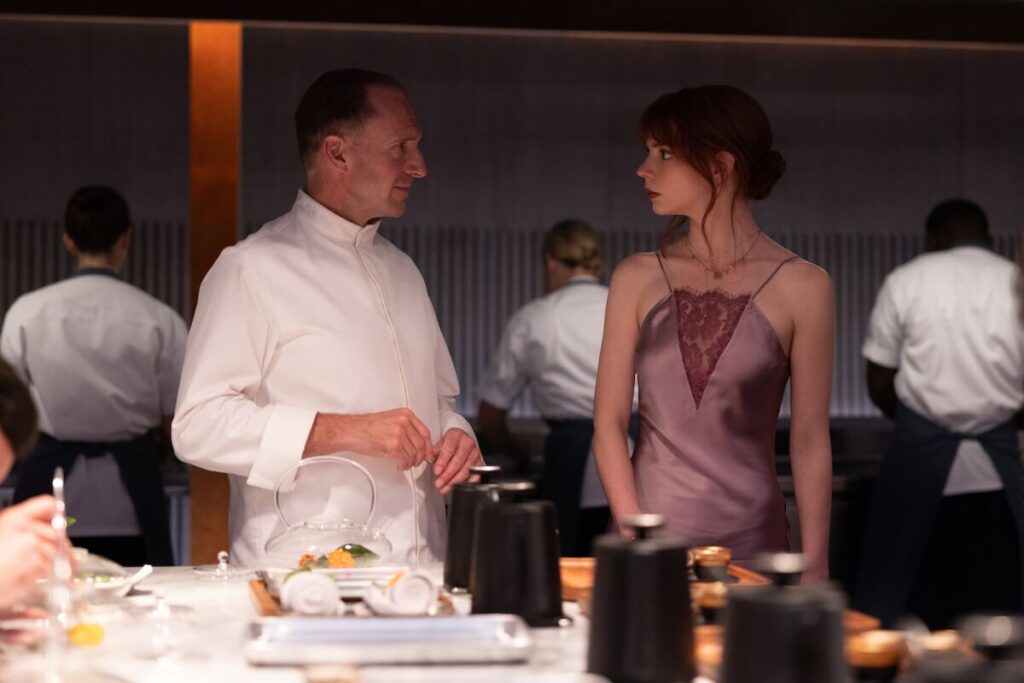
I’m not going to pretend that these types of movies aren’t 3 years away from debuting on streaming. But if you’re looking for a really fun story and a really well-written script, don’t go see Black Panther 2. Don’t go see She Said. See The Menu.
If you have no interest in going to the theater and just want to watch something good, I suggest firing up HBO Max and watching No Country For Old Men. I watched the film for dialogue tips (Yes, I’m STILL WORKING on the dialogue book – It’s coming! I promise!) and became so into the story, I ended up completely forgetting about dialogue.
The movie is the epitome of what I preach on the site – KEEP IT SIMPLE! It’s the simplest of simple stories, told with a likable protagonist, a super-compelling antagonist, and a bag of money. Sure, a couple of other people enter the story later on, but, at its heart, it’s two strong characters and a dramatic situation.
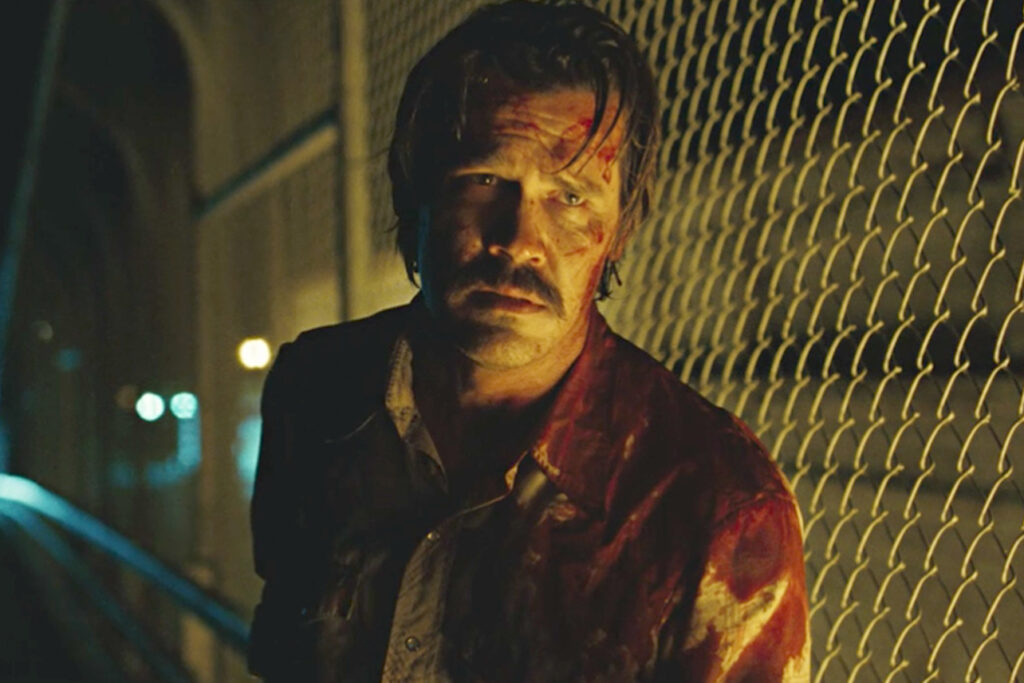
Something that struck me about the film was that, traditionally, the problem with this type of setup is that the villain has the primary goal (to catch the protagonist) leaving the protagonist with the weaker, more reactive, motivation (their job is to, essentially, wait and react to the antagonist). But Llewelyn’s character is written in a surprisingly active fashion. He knows he’s being chased by a de facto Terminator, so he’s always constructing plans to trick Anton (the bad guy) whenever Anton catches up to him.
For example, Llewelyn knows Anton will probably figure out what motel room he’s in and, therefore, buys the room next to his and sleeps there instead. He then waits for Anton to inevitably show up to his original room so he can figure out who’s chasing him and escape before this psycho can hurt him.
That’s a big part of what’s so fun about the script. It’s a chess match. But it’s an ACTUAL CHESS MATCH. So many writers don’t have the capability (or the discipline) to come up with genuinely clever moves from each character. This script is full of them.
One of my favorite moments is Llewelyn sitting in a dark hotel room in the middle of the night, terrified that Anton is coming. And then, finally, Llewelyn sees two dark shadows in the thin streak of light at the bottom of the door. But before he can do anything about it, the feet shadows disappear, and then, ten seconds later, the hall light goes dark. Anton went and turned it off specifically so that Llewelyn would not be able to see anything in that slit of light underneath his door. What other writer thinks of details like that??
But it really is amazing how captivating the movie is considering that it boils down to such a simple premise. I would love to have the Coen Brothers who made this movie return. They’re always at their best when there’s a bag of money involved. Although half the Coen team is coming out with a pretty good script himself, in Drive Away Dykes.
Did anybody see Black Panther, The Menu, or She Said this weekend? What did you think?
EDIT: QUICK THOUGHTS ON IGER RETURNING TO DISNEY – Since this just happened as I was about to go to bed. I never understood why Iger left in the first place. He was doing the best job leading the company since Disney himself. He was still young. Yet for some reason all Disney could talk about was replacing him. It didn’t make a lick of sense. So, in that sense, I’m not surprised he’s back.
The question is, what caused this dramatic change in leadership? No matter how many things you can knock Disney for, they have still done better than every other studio. They are still miles ahead of everyone else. And while Netflix is stagnant with their service, Disney Plus is still adding people. Didn’t they just add another 12 million subscribers last quarter?
I’m wondering if this is strictly a Marvel problem. Is it because all the Phase 4 movies were bad except for the one not made by them (Spider-Man)? Is it because Chapek allowed a group of people who hadn’t written anything to steer a 150 million dollar show in She-Hulk? Are those the reasons Chapek is out? I’m sure we’ll learn more in the coming days. But wowzers, this is huge news.
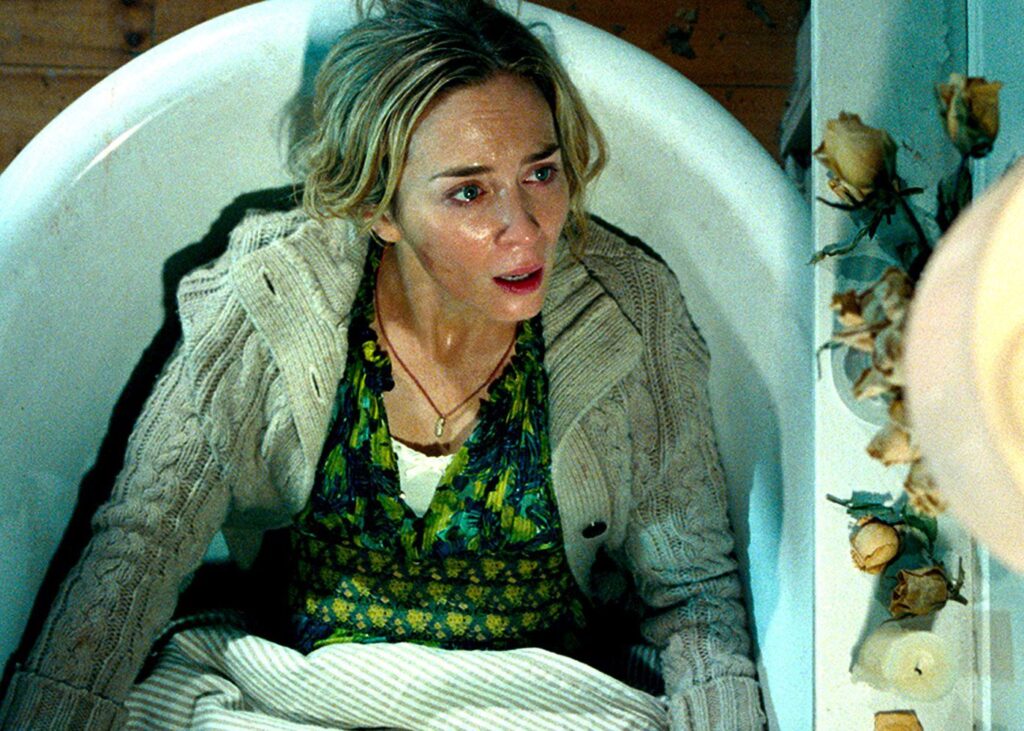
High Concept Showdown is just 11 days away!
For those new to Amateur Showdown, you submit your pitch, along with a PDF of your script. I then post the five best submissions on the site. Those five scripts compete on the site over the weekend. It will be up to you guys, the readers of the site, to read as much of each entry as you can and vote for your favorite. The script with the most votes then gets a review the following Friday.
The theme of this particular showdown is HIGH-CONCEPT. That means you have to have a big splashy idea. It doesn’t necessarily have to be high budget. Eternal Sunshine of the Spotless Mind was a high concept and the movie cost 15 million to make. I understand that “high-concept” is a, somewhat, vague term. So if you think your script is high concept but you’re not positive, submit it. Who knows? Maybe it makes the cut.
What: High Concept Showdown
Deadline: Dec 1, 2022 (Thursday) by 8pm Pacific Time
Include: Title, Genre, Logline, and a PDF of your screenplay
Additional: Also, feel free to pitch, more extensively, why your script deserves to be featured. Sometimes this is the difference between people checking out and not checking out your script. Think of this as your “elevator pitch.” You’ve got the producer in the elevator for a minute. Explain to him why he needs to read your script.
Where: E-mail all entries to carsonreeves3@gmail.com
Cost: Free
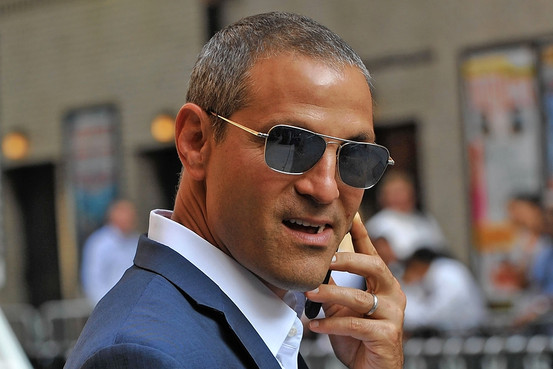
Okay, I’m a little fired up here but stay with me. The ultimate purpose of this post is a positive one. I want to help everybody reach their full potential as a writer, which means finding them their perfect agent match.
Last week, I posted an article about whether to pursue a studio or artist path as a screenwriter.
In regards to the “artist” path, I said the main thing you’re trying to do is get on the Black List. And since the Black List is voted on by development execs, it’s exclusively fueled by scripts that agents and managers send out.
One of you then pointed out, “Hey, Carson, this article is fun and all but none of it is relevant unless you get an agent. Since getting an agent is really really really hard, this article is more fantasy than reality.”
That’s what I want to address today because while this commenter was right, the comment was phrased in such a way that we might as well have been placed in a DeLorean and sent back to 1985 with how impossible it is to get an agent in Hollywood.
People.
It is 2022!!!
It is easier to get a rep than ever before in history.
I’ve said it before but I’ll say it again. The number one strategy for getting on the Black List is going over to the Black List site and downloading the last three Black Lists.
From there, read all the loglines, figure out which ones are the most similar to your script, and write down the agents and managers representing those writers (which are listed underneath the logline). Then get a 7 day free trial at IMDB Pro, search for those agents and managers, which will give you their e-mails.
Then e-mail these agents/managers with a query that looks something like this…
Hey [Name of Agent],
I’m a huge fan of your client’s, [Name of Client], script, [Name of Script]. It was my favorite script of last year.
I have something along the same lines that I believe you’d love. It’s called [Title of Your Script] and it’s about [Logline of Your Script].
Let me know if it’s something you’d be interested in reading and I’ll send it over.
Thanks so much,
[Your Name]
Note the simplicity of the query. That’s on purpose. These people do not have time to read about your trip to Africa when you were 8 and how your close brush with death during a safari inspired you to start writing movies.
The main point you want to get to – and get to fast – is the title and logline. Cause that’s all they care about. If it sounds like a good script, they’ll request it. If not, they won’t.
For an unknown screenwriter, this is your best strategy for getting an agent or manager. Does it help if your script is referred to them by a mutual friend or someone like me? Of course. Referrals are always helpful in an industry that has an endless number of creators competing for attention. But if that option isn’t open to you, you have to do cold querying.
There are some agents and managers who don’t put their contact info up on IMDB Pro. But that shouldn’t stop you. Ask people here in the comments for that info. I know a lot of you have reps e-mail addresses.
And look – I get that this is far from a “sure thing” for snagging a rep but TOO BAD! This process needs to be hard. If it were easy, everyone would do it, and then you’d have the exact same problem once you got your agent, which is that they represent 6000 other clients and now you’re desperately vying for their time.
The reason it’s hard is to filter out the un-serious writers and the people who don’t try hard enough. If you say to yourself, “I’m going to get a rep no matter what,” and give yourself two months to do so and only do everything to achieve that goal, you’re probably going to achieve it.
But if you’re more comfortable hanging off to the side and complaining that the game is rigged, well, good luck with that. I guarantee that’s not going to get you any closer to finding an agent.
Now let’s say you do this but you don’t get any script requests. As someone who has received thousands of queries, I can tell you that this is probably due to one of three things.
One, your concept isn’t very good. Two, your concept might be good but your logline is clunky, indicating that you’re not a very good writer. Three, the query itself is clunky. There are spelling issues, grammar issues, or ‘prattling on’ issues.
You need to identify which one of these three things is the problem and fix it. That means sending these queries off to friends – preferably knowledgeable screenwriter friends (which you can find here on this site if you don’t have them) – and asking them for an honest assessment of the logline and query.
I can’t stress enough that if these people aren’t honest with you, this plan is pointless. I even see it sometimes on this site where someone posts a weak logline in the comments and people act like it’s pretty decent, giving them false hope and sending them off on a de facto suicide mission. I don’t want anyone to be mean to anyone else. But there are ways of saying a concept is weak without being rude. “I don’t think this logline works. There’s nothing unique here. I wouldn’t write this if I were you.”
If your concept and logline are getting good reactions from friends but not agents, it might be your query that’s the problem. The problems I see in most queries is that they’re unfocused. They’re sloppy. And they ramble.
The reason this is an issue is because in almost every instance, the problems I see in a query extend out into the script itself. If the query rambles, the script rambles. If a comedy script query includes a few joke-attempts that aren’t funny, the script isn’t funny. If the writer includes a few tells that they’re new to screenwriting, the script ends up feeling like a newbie script.
That’s why I included the above query blueprint. I suggest you use that. If you’re no stranger to the query game, you can go a little further. If you can bring yourself closer to the agent in any way, that helps. For example, if you can say something like, “I recently saw Bones and All at Toronto and spoke with your client, David Kajganich, afterwards. He was such a cool dude who clearly loves writing. It must be rewarding seeing him experience all this success.”
I can vouch for myself here. Personalized touches like that are harder to pass up. When someone e-mails me and compliments something I did, it makes me feel good, so I tend to pay a little more attention to that query. But if someone mentions someone I know that they know, I’ll almost always open the script and read a page or two just to see how the writing is and if I get pulled in.
But let’s not lose sight of the goal here. The goal is to genuinely put yourself out there and query everyone you find an e-mail for. That’s your best ticket to a manager. And it’s totally possible that you get a rep out of this. I mean, you’ve seen some of these Black List scripts I’ve been reviewing lately. I’d say 25% of the people who comment here are at least as good as those writers.
But don’t blow your chance with a weak logline or a weak query. Get feedback first. Also, if you run into the worst case scenario, which is that nobody likes your concept, you’re going to have to accept that and move on to the next script. I know that sucks but we’re not playing in the National league here. We’re playing in the Premiere League. Nobody gives you credit for trying.
Put your big girl boots on and do the smart thing this time. Get feedback on your concept BEFORE YOU WRITE THE SCRIPT. Not after. Cause while there’s a little bit of wiggle room when it comes to dressing up a weak concept in a logline, it’s still putting flavored chapstick on an oinker. So let’s get that figured out before you spend the next four months of your life writing something.
And to jack this up a notch, I’m going to check back in with all of you two weeks into the new year. And I want to hear some success stories about getting agents. I will not stand for anything less.
Let the Agenting begin. Share your concepts, queries, manager e-mail addresses, and anything else related to today’s article in the comments.
While I encourage you to get logline, concept, and query feedback from your friends, if you want to get professional feedback from the guy who’s poured through tens of thousand of queries and read just about every idea in the world, e-mail me at carsonreeves1@gmail.com for a logline consult ($25) or a query consult ($50). I also do full feature script consultations as well.
Genre: Drama (sort of a romantic comedy too)
Premise: After her son dies, a grieving mother decides to look for a mate who will get pregnant with the son’s frozen sperm.
About: This script finished with 7 votes on last year’s Black List. If you want to see my re-ranking of all the scripts from last year’s Black List, you can check it out here.
Writer: Geoffrey Roth
Details: 122 pages
 Juno Temple for Audrey?
Juno Temple for Audrey?
I love a good underdog story.
So there’s no one rooting for today’s 72nd ranked Black List script more than me. There’s already been one Black List “worth the read” that got 7 votes (“False Truth”). Can we make it two??
We meet Ben, who’s in his early 30s. Ben informs us, much like Lester Burnham at the beginning of American Beauty, that he’s dead. Ben lived a really full life, though. He was a fun guy with a lot of friends who traveled a lot. The only thing he didn’t achieve before he died was starting a family.
Ben introduces us to his mother, Laurie, who helps out with a foundation of Ben’s, which has capitalized on Ben’s obsessive travel experience by taking all of his videos and turning them into a virtual reality experience with “VR Ben” as the guide. The hope is to sell the company and use the profits to save our dying planet.
When Laurie learns that Ben froze some sperm, she becomes convinced that her new goal in life is to impregnate a young consenting woman with this sperm so that Ben can have a child. So Laurie does the only logical thing one does in these situations – she joins Raya as her dead son.
She starts getting matches left and right, to which she then goes on the dates and tells the women that she’s “Ben,” and that the actual Ben is dead, and, oh yeah, could you please get pregnant with his sperm? Naturally, young hot in-heat females don’t respond well to being told that their date is dead and can you get pregnant.
Coincidentally, a swimming friend of Laurie’s, Aubrey, matches with Ben on Raya, and Laurie uses the opportunity to sell Aubrey on the idea. At first, Aubrey is freaked out, just like everyone else. But after she “meets” Ben in his VR traveling simulation, she actually starts to like him. Against all that one would consider good judgement, Aubrey considers the unthinkable – getting pregnant with Dead Ben’s sperm.
For the record, a specific song cue on page 1, accompanied by a 122 page run-time, is not the best way to endear yourself to a reader.
Now that we’ve got that out of the way, let’s discuss the script, which is a bit of an odd duck.
On the surface, we’ve got a semi high concept idea here. A grieving mother starts “dating” young women in the hopes of finding one who will have her dead son’s baby via his previously frozen sperm. Like a much sadder version of Juno.
That’s definitely an inventive concept and I give the writer props for that. Especially because one of the hardest genres to infiltrate with any sort of originality is the romantic comedy. This concept allows for a new spin on that formula.
And it gives us some fun scenes in the process, such as young women matching with Ben on dating apps only for Laurie to show up, tell them the guy they matched with is dead, and that she’s hoping they’ll agree to get impregnated by him posthumously. I mean I’m laughing out loud as I type that. Those will make for a hilarious montage.
But something wasn’t working with the script. Let me see if I can come up with an analogy for why that was. The Way You Remember Me is a brand new house where none of the screws have been tightened yet. It feels too loosey-goosey, and in the process, is hard to buy into.
The loosest of the screws is Ben’s VR subplot. This team of people who loved Ben used all of his travel videos to turn them into a VR experience with Ben being the VR guide.
I understand why the writer did this. It allowed for Aubrey to step into that VR world and sort of be around Ben, almost like she’s dating him. But it’s just not believable on any level.
It’s one of those things we writers notoriously do. We see a problem and we’re so determined to solve it that we don’t hold it up to real-world standards. We use our own internal ‘movie-logic’ instead.
The problem-to-be-solved in “Remember Me” was: “Well, if Aubrey never knew Ben, why would she agree to have his child?” So the writer said, “Well, what if there was this posthumous foundation for Ben that was… ummmm, working on a… VR experience!…. And… ummmmm…. Like, Ben used to be a travel nut and taped all his travel exploits and they were working on turning those into a VR experience and THAT WAY we can have Aubrey “meet” Ben almost like they’re meeting in real life!”
Come on already. It’s such a clearly writer-generated fake situation that it doesn’t pass the suspension of disbelief test.
One of your jobs as a screenwriter is not just to solve problems. It’s to solve them elegantly. It’s to solve them in such a way that they are invisible and the audience is so immersed in them that they never consider the idea that a writer is writing it.
You know who I learned this from? “House of the Dragon’s” Ryan Condal. He used to talk about this all the time back on the Done Deal message boards. Your solutions can’t be so big and outrageous and “movie-logicy” that they break the suspension of disbelief.
Newbie writers are the biggest violators of this because they don’t respect the reader yet. They think the burden is on the audience to go along with whatever they come up with, as opposed to truth, which is that the burden is always on the writer.
Another issue with this script is that it was clearly written by someone who doesn’t read a lot. I know this because if they’d a read a lot of scripts, they would know some of the basic things that readers dislike. Like dual-side dialogue. Giant paragraphs. Big page counts. Unnecessarily over-written openings that go on for too long and, therefore, delay when we get to the actual plot.
One of the reasons I think yesterday’s book was so excellent – and, mind you, it’s a book with 70,000 more words and yet read much faster than today’s script – is that the author was an editor for 20 years. So they’d read so many books.
That’s why The Maid reads so effortlessly, and why I remind aspiring writers at every turn to READ AS MUCH AS POSSIBLE. Because I guarantee you, you will accumulate a list of things writers do that annoy you, and, in doing so, ensure that you never make those mistakes yourself.
The Way You Remember Me is like a lot of Black List scripts these days. It’s imperfect. It has some good things. But it doesn’t feel ready in the way that you pour over your work and make it the best it can possibly be before showing it to anyone ready. Which is why I’d retitle it, The Way You Won’t Remember Me.
Script Link: The Way You Remember Me
[ ] What the hell did I just read?
[x] wasn’t for me
[ ] worth the read
[ ] impressive
[ ] genius
What I learned: Controversial take! This script was super heavy on the music cues. But I’m telling you, music as writing inspiration is HIGHLY DANGEROUS. The beauty of the songs you listen to, and the way they reverberate within you, fools you into thinking that the stuff you’re writing is amazing, when, in reality, it’s just the songs you’re listening to that are amazing. A great scene or a great sequence should be great without a single note of music behind it. This script read like the writer was lost in the power of his music. As a result, the music was doing all the heavy-lifting.
Say hello to the movie that’s going to win Florence Pugh her first Oscar.
Genre: Drama/Thriller
Premise: A maid on the autism spectrum unexpectedly finds herself wrapped up in a high profile murder at the fancy hotel she works at.
About: This book was sent out last year, before publication, to Hollywood, where Florence Pugh got hold of it and quickly signed on. The book was officially published this year and quickly rose to the New York Times best seller list. This is author Nita Prose’s first novel. Just to show you how important it is for writers to read, Nita was a long time editor before she finally broke out with this book. She is from Canada. I will try not to hold that against her.
Writer: Nita Prose
Details: 290 pages

It is becoming harder and harder to make non-gigantic IP properties theatrical releases. Anything that has even a hint of drama and genuine acting in it is dismissed as a streaming movie.
The only way these movies can now become studio releases is if they go TO-THE-NINES on the production. They get a big actor or actress. They give the film 3x as much money as a movie like this would normally cost. They build the most amazing sets and costumes imaginable. And they get a high-level director who directs the s**t out of the movie.
I’m talking every shot is a piece of art.
That’s the only way something can stand up to a Wakanda Forever or a Fast and Furious. You’ve got to see the trailer and it’s got to physically look amazing.
They should do that for The Maid because it deserves it. It’s a really fun story with a great star-making role.
Molly Gray works at an upscale hotel in New York. She’s a maid. And not just any maid. She’s the most dedicated maid you’ve ever watched clean. All she cares about is cleaning. All she cares about is leaving every room in perfect condition.
A big reason for this is that Molly is on the spectrum. She is autistic and while she doesn’t understand the complexities of human interaction, she understands how to make any room look and smell brand new. This is in large part because of her grandmother, who was also a maid. Unfortunately, her grandma, who was her only friend in the world, died recently.
What begins as a normal day at the hotel turns very un-normal. While cleaning the room of the hotel’s highest profile guests, the Blacks, Molly finds Mr. Black dead on the floor. She immediately alerts the hotel manager and that’s when the craziness begins.
Long story short, Molly has been friendly with Giselle Black, the wife of the dead man, who becomes suspect numero uno. Terrified for her friend, Molly tells the cops that she doesn’t know Giselle well, which they quickly find out is a lie. Molly then goes to her crush, the guy she considers her best friend at the hotel, bartender Rodney, for help. But what she doesn’t know is that Rodney may be involved in this somehow. And he’s not afraid to throw Molly under the bus if it means saving himself.
When Molly then becomes the number one suspect, she will have to team up with a local lawyer and get several of the hotel workers to covertly admit that they had a hand in this. But with her unique condition, will she be able to pull it off? Or will she, for one final time, be taken advantage of?

The way actors used to hunt for that big Oscar gold was to take on the role of a mentally challenged person. From Forrest Gump to Sling Blade to I Am Sam to Radio to Me Time. Some had success getting that Oscar, others didn’t.
These days, Hollywood’s become so terrified of Twitter attacks that they don’t want to get anywhere near the “R” word. So they’ve come up with a replacement – autism. Autism allows for characters battling difficult mental conditions. However the characters are still fully functional and, therefore, okay to portray.
We saw this in Silver Linings Playbook. We saw it in The Accountant. We saw it in The Imitation Game. This is one of the best character strategies screenwriters can use because actors will fight each other in gladiatorial arenas to land one of these parts. And it’s rising star, Florence Pugh’s, turn, to put on the armor.
Now, not every autistic role is created equal.
Where most writers go wrong is they only have the barest understanding of autism. They build their character around other autistic characters they’ve seen on TV and in film. Sometimes this can work if you’re writing a comedy (Sheldon in The Big Bang Theory). But if you’re writing a drama, you better understand autism as well as the greatest doctors in the world. Because in order for these characters to work, they must feel authentic.
That’s why The Maid works. And that’s why it rose to the top of Hollywood’s priority list – so much so that they went to their number 1 “It” girl to see if she’d do it. And she loved the character so she was in.
The great thing about autism (I may be the only person who’s ever written that) is that it enacts what I call “The Protection Principle.” The Protection Principle is when the reader feels protective over the main character. They want to make sure they’re okay. They get angry when others take advantage of them.
It can easily be said that the reason Forrest Gump is so popular is because of the Protection Principle. We love him so much that we want to protect him from the big bad world and all the people trying to take advantage of him in it.
The Maid may be the only story that leans more heavily into the Protection Principle than Forrest Gump. I can’t remember the last time I wanted to shield someone from pain more than Molly. She’s such a sweet girl. She’s so naive. Everyone’s taking advantage of her. And it very well might send her to prison for the rest of her life.
What’s so great about this book, though, is that the desire to protect our heroine grows with every chapter. By the time the cops have angrily arrested and accused her of all these things, we’re so charged up we want to drive down to our closest governmental establishment and demand justice. That is until we remember that, oh yeah, this is a fictional story.
The book is a great reminder that writing any story is about getting the BIG THINGS RIGHT. Concept. Character. Plot. We get so wrapped in the minutiae and, while I’m not saying the details aren’t important, they’re not nearly as important as the big three.
I might even take that a step further and say, even if the only thing you get right is the main character, as long as you get it REALLY REALLY RIGHT, you will write something of value that people will want. Especially in this business because it’s all about getting that big actor to sign on and bring buzz to your project so it can get made and, if you nail your main character, that’s exactly what will happen.
What works so well about Molly’s autism and the Protection Principle is that it introduces a level of dramatic irony. It’s established early on that Molly is obsessed with Rodney, the bartender. She loves everything about him, from the way he smells to the way his forearm muscles ripple when he places his hand down on the bar table.
But as Molly describes Rodney and how much she would love to make him her boyfriend, we see things that she doesn’t. We notice that he calls her “special” to others (“He called me special,” Molly beams. “I knew there was something between us.”). We notice that he’s being nice to her, but in a slightly patronizing way that she’s misinterpreting as romantic interest.
In other words, we know early on this guy is probably bad news. So we want to protect Molly from him. But poor Molly can’t read any social cues so she doesn’t see what we see. And it makes us frantic to keep reading and hope that she figures it out before it’s too late.
There’s a chapter late in the book where Molly needs help with this gun that she’s helped sneak out of Giselle’s hotel room, and she decides to ask Rodney for his assistance. And we’re sitting there screaming, “NOOOOOOOO!!! That’s the last person you want to tell!” And, of course, Rodney then uses that information to frame Molly.
Honestly, the plot itself isn’t anything special. It’s a got a few twists and turns. But the reason we’re so invested is because the character is so great. And the character is so great because of the autism choice, the authenticity through which that condition is explored, and the byproduct of that autism, which is the ignition of the Protection Principle.
Those three things kept me turning the pages and, when I finished, I had no doubt that Pugh was winning an Oscar. It’s a done deal already. Just give it to her now. I know that’s never been done before – that an actor is given an Oscar before she starts shooting the movie – but I promise you this is the one time we can break that rule.
[ ] What the hell did I just read?
[ ] wasn’t for me
[ ] worth the read
[x] impressive
[ ] genius
What I learned: This is an AMAZING book to read to learn how to make a character likable. Not just because of the autism thing. But Molly’s best friend in the world, her grandma, died recently. The head maid at the hotel, Cheryl (who Molly’s nicknamed “Cherylnoble”), goes into Molly’s rooms ahead of her to always steal her tips. A former boyfriend took all of her and her grandmother’s money. When others take advantage of our hero, we love our hero more than anything. And because Prose is a such a good writer (how could she not be with that last name?), it all feels very authentic. None of it is desperate over-the-top “please like my hero” writing. I honestly can’t remember the last time I loved a character this much.
What I learned 2: All of the above only works if the protagonist still has a positive attitude towards life. It doesn’t work if your hero feels sorry for themselves and gives up. We love this character so much because in spite of all these things that happen to her, in spite of a job that might depress others, she still gets up every day and has the most positive optimistic attitude in the world.
What I learned 3: A dead body and a really unique main character is one of the most reliable setups for a story out there.
What I learned 4: NO EXCUSES! Nita’s job took up her entire day so she got up at 5am every morning and wrote for 4 hours before her day job. It took her 5 months to finish a first draft.

